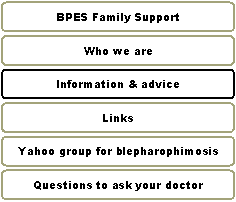|
Some advice from people with BPES
Sunlight / bright light
Most people with BPES that the light bothers them. Even on a winter day, the bright low sunlight can be very uncomfortable. Here are some ideas: · Make sure that you have some good sunglasses. For babies, try to get some ski goggles. When you put the goggles on, make sure they are not too tight. The baby may be trying to use its eyebrows to raise the eyelids. · Try not to have ceiling lights. Wall lights or table lamps are much better. If you need to use ceiling lights, then try out “up lighters” or Chinese paper lanterns. Both of these types of shades are able to defuse the light to all of the room. · In your car, try using screens or shades that attach to windows. Consider using a floppy hat with a wide brim, you will be able to adjust the hat easily to provide some protection. · Be extra careful in shops and restaurants. Often they have big glass windows and doors, letting in lots of light.
Dryness
Some people experience a feeling of dryness. Sometimes they have a medical condition associated with BPES, perhaps a problem with tears. · Using a simple eye ointment at night is very helpful. Talk to your physician about this. · If your house is too dry (perhaps from air-conditioning or central heating), then try hanging out your wet laundry in their room. This will help to provide moisture in the room. Some people use humidifiers, but some models can be rather noisy |
|
Information & advice
Over the years these questions have come up frequently.
My child has just been diagnosed with BPES. What shall I do?
Do all people with BPES look the same? No – there is quite a difference in appearance. In some people the symptoms are so mild that they may be unrecognized.
At what age should surgery start? Each person should seek expert medical advice to find the best treatment for their specific set of circumstances. Some people never have any surgery. It may be useful to people to look at recent medical articles on surgery to learn a bit more about the terms used and the procedures which are common. Click here and look at the section called “Management“.
Is the surgery carried out the same way for each child? No. Whilst some procedures are very common, experiences may be different.
I have BPES. Can I pass this on to my children? This is a good question to ask your doctor. Click here and look at the section called “Genetic Counseling“.
I have BPES, but my brothers and sisters don’t have it. Can they pass it on? This is a good question to ask your doctor. Click here and look at the section called “Genetic Counseling“
Can men have “Type 1” BPES? No. Only women can have Type 1 BPES
Our child has BPES, nobody else in our family has BPES. How did this happen? This is a good question to ask your doctor.
My child has many more problems that that described on your web site. What shall I do?
Some children are born with characteristics of BPES, in addition to other health conditions. It is important to have a thorough evaluation by a medical geneticist to confirm the diagnosis. A medical geneticist is the medical professional most knowledgeable of genetic disorders. Click here and look at the section called “Differential Diagnosis“
I have heard that some people are sensitive to light, have astigmatism, or problems with tear ducts. Are we to expect these problems? Not everyone has the same symptoms, and even if they do, there can be a range in severity. This is a good question to ask your doctor.
Is pre-natal testing possible? This is a good question to ask your doctor. Click here and look at the section called “Pre-natal Testing“ |
|
BPES Family Support |

